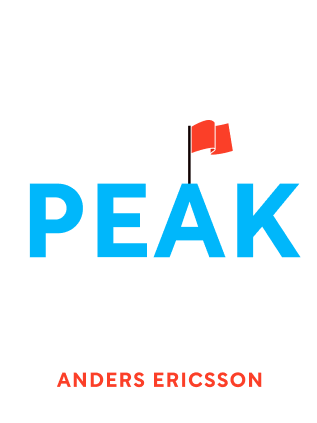

This article is an excerpt from the Shortform book guide to "Peak" by Anders Ericsson. Shortform has the world's best summaries and analyses of books you should be reading.
Like this article? Sign up for a free trial here .
What is Peak: Secrets From the New Science of Expertise about? How can Anders Ericsson teach you how to master any skill?
To truly improve at a skill, you need to change how you practice. Peak: Secrets From the New Science of Expertise explores how humans develop skills and the process by which peak performers in music, athletics, and countless other fields develop their abilities.
Continue on to learn more about Peak: Secrets From the New Science of Expertise by Anders Ericsson and Robert Pool.
Peak: Secrets From the New Science of Expertise, Explained
Peak: Secrets From the New Science of Expertise explores how humans develop skills and the process by which peak performers in music, athletics, and countless other fields develop their abilities. While it may seem as though figures like Chopin, Beethoven, or Roger Federer rely solely on an innate talent that makes their extraordinary feats seem effortless, what they do actually requires a great deal of effort. Indeed, the secret to their success was practice. They practiced a lot and they practiced the right way.
Most of us think of “practice” as the simple repetition of a task. And, to be sure, this kind of practice will yield some results. If you’re learning how to play tennis, for example, you’ll probably be able to iron out your most embarrassing mistakes and figure out how to serve the ball somewhat competently. But this approach actually stunts your learning. Once you reach your accepted level of performance, you’ll plateau and stop improving. To truly improve, you need to change how you practice.
Purposeful Practice
Peak: Secrets From the New Science of Expertise starts out with an explanation of purposeful practice. Purposeful practice is distinct from merely repetitive practice in a few specific ways.
- Purposeful practice has well-defined, specific goals. If you’re learning to play a piece of music, your practice regimen shouldn’t be “I’ll just play for an hour every day.” It should be, “I’ll play the piece until I can do it without any mistakes three times in a row.” The key to purposeful practice is putting a series of small steps together as you work toward a longer-term goal. Each subsequent step challenges you just a bit more than the previous one.
- Purposeful practice demands complete focus. You need to give the task at hand your full attention and keep your mind squarely on the thing you’re trying to achieve.
- Purposeful practice involves feedback. You need someone who can guide you, praise you when you do something right, tell you precisely how you’re falling short—and how you can improve.
- Purposeful practice requires you to step out of your comfort zone. You’re never going to improve if you only do the things that are already easy for you. Once you’ve gotten comfortable, it’s time to challenge yourself further. The quality of practice matters much more than the quantity.
For example, research has shown that doctors who have been practicing for 30 years actually do worse on certain measures of performance than their colleagues who are only a few years out of medical school. This is because the senior doctors aren’t engaging in purposeful practice. Most of their day-to-day activities keep them squarely in their comfort zone: they aren’t being challenged at all.
Purposeful practice can be remarkably effective. Anders Ericsson, author of Peak: Secrets From the New Science of Expertise, once conducted an experiment to see how many digits a test subject, named Steve, would be able to memorize and recite in a numerical string. At first, Steve couldn’t memorize strings longer than nine digits. It seemed that he had reached some sort of natural plateau.
The author decided to try purposeful practice to help Steve push through this barrier. He would present Steve with five-digit strings: if Steve repeated it back correctly, the author would add one more digit to the string to make it six digits. If Steve got it wrong, the author would drop the length of the string by two digits. And it worked: in a few days, Steve managed to memorize an 11-digit sequence, two better than his previous record. After hundreds of sessions, Steve was able to successfully recite back 82 digits!
Deliberate Practice
The core of Peak: Secrets From the New Science of Expertise is deliberate practice. Truly effective practice goes a step beyond purposeful practice, to deliberate practice. Working hard and pushing yourself beyond your comfort zone, by themselves, are not enough. Deliberate practice builds on the principles of purposeful practice, but it applies them in a systematic, rigorous framework that leads to the kind of performances we see from acknowledged experts. Unlike purposeful practice, deliberate practice isn’t about fulfilling your potential—it’s about building it, making possible what was once impossible.
With deliberate practice, you are working with highly developed and well-accepted training methods that have been proven effective in getting results. These methods have been honed and perfected by those who came before you into a near-science. With purposeful practice, if you push yourself, you might see improvement. With deliberate practice, you’ll become an expert.
There are a few key features of deliberate practice.
- Deliberate practice can be measured precisely. Whether it’s a win/loss record in chess or your finish times in a sprint, there are objective ways for you to evaluate your performance.
- Deliberate practice is competitive. This provides aspiring experts with a motivation to keep practicing and improving. You want to be the best in your field.
- Deliberate practice is time-tested. You’re not trying to do something that no one else has ever done before. Instead, you’re operating in a field where best practices have been developed over a long period of time—even centuries. You’re following the template that experts before you have followed successfully.
- Deliberate practice is done under the tutelage of teachers and coaches. With deliberate practice, you’re working in a field whose high level of development and venerable history of best practices have produced a highly skilled and sophisticated cadre of professional mentors who can guide you every step along your path to expertise.
- Deliberate practice demands maximal effort, which is often unpleasant.
Deliberate practice is how experts become experts. In a study of violin students at the Berlin University of the Arts, a team of researchers set out to determine whether the best performances were the product of deliberate practice or innate talent. Given the extreme difficulty of playing the violin, it requires a great deal of solitary practice time to master the instrument. It is crucial to practice outside of scheduled sessions with one’s teacher. While acknowledging that it wasn’t fun, the students saw practice as being crucial to their development as musicians, so they kept to it.
The researchers found that the only major difference between the students they had deemed “good,” “better,” and “best” was how much time they devoted to solitary, deliberate practice. They calculated that the “good” students would practice an average of 3,420 hours on the violin by the time they turned 18; the “better” students would practice an average of 5,301 hours; and the “best” students would practice an average of 7,410 hours. There were no shortcuts to becoming an excellent violinist. All of the top achievers had devoted several thousand hours of practice to the instrument: none of them were “prodigies” who simply surpassed their peers without putting in any practice.
There are no big leaps or breakthroughs with deliberate practice. What looks to an observer like a sudden leap forward is actually just the last in a series of baby steps.
Mental Representations
Critically, deliberate practice depends on effective mental representations, which show you how to do your task properly and correct yourself when you make mistakes. Mental representations are templates that correspond to objects, ideas, or anything else that the brain might be thinking about.
You may not realize it, but you use mental images every day. Think about a famous image, like da Vinci’s Mona Lisa. When someone mentions it, you can “see” the painting in your mind’s eye—this is a mental representation. Mental representations are key to memory, pattern recognition, and all the other highly developed abilities needed to be a top-ranked pitcher, chess player, or pianist, providing meaning and context that aids us as we assimilate and process information.
A key part of forming good mental representations is the ability to recognize patterns where others see only random and formless data. Most of us are only seeing a collection of trees: experts see the forest.
In one experiment, soccer players were shown video footage from a soccer match and then asked to predict what was going to happen next on the field. The results showed that the more accomplished players were more accurate in their predictions of what the next move would be than were the less accomplished players participating in the experiment. The better players were able to take a full assessment of the conditions on the field and see patterns that enabled them to predict what the optimal next move would be. They had a mental representation of which players’ movements mattered the most, to whom they ought to pass the ball, and so on.
Deliberate practice and mental representations reinforce one another: the more skilled or knowledgeable you become in a given subject through deliberate practice, the more effective your mental representations will be—and vice versa.
The story of Russian chess master Alexander Alekhine shows how mental representations can drive extraordinary performance. He was one of the world’s best in “blindfold” chess—a version of the game in which one of the players does not have the board in front of them, and must make all their moves and strategic calculations from memory. Through his mental representations, Alekhine had developed the ability to visualize the entire chessboard in his memory and move the pieces around in his head.
Alekhine’s aptitude for blindfold chess grew out of his extensive, deliberate practice in standard, non-blindfold chess. Like many chess masters, his abilities in blindfold chess were a product of the years of experience he had in the game: because he knew it so well, he had the ability to draw an extraordinary mental representation of a chessboard.
Applying the Principles From Peak: Secrets From the New Science of Expertise
While it’s true that applying the principles of deliberate practice is most effective in fields like classical music and chess, you shouldn’t take that to mean that you can’t apply them anywhere else. Peak: Secrets From the New Science of Expertise says that deliberate practice can improve your performance and that of your organization, in whatever field you’re in.
But it’s only possible if you and your organization let go of the idea that individual ability is solely determined by genetic characteristics. This belief isn’t true: deliberate practice matters much more than raw talent or ability. Indeed, apart from people who suffer from severe physical or mental limitations, with the right practice, just about anyone can improve in any area they choose. You also have to recognize that it’s about more than just repetition or hard work. Simply “trying harder,” by itself, will not yield the desired results. There’s usually a right way and wrong way to do something. If you’re doing something the wrong way, but “trying harder,” you won’t see much difference (and, in fact, you might make things worse by doubling down on your faulty approach).
In a regular 9-5 job, the key is to transform regular time at the office into an opportunity for learning and skill-building. This gets everyone in the company used to the idea of practicing itself—it just becomes a normal part of the business day.
Mock scenarios are particularly good for professional skill-building. They allow team members to practice over and over again, receive lots of feedback, and perfect their skills without the usual costs of failure. These sorts of simulation programs have proven particularly effective in medicine.
In diagnosing breast cancer, for example, radiologists are tasked with interpreting x-rays to determine whether cancerous cells are present or not. But they’re rarely ever told if their analysis was correct, as the results are typically sent to the patient’s personal doctor. Based on what we know about the need for feedback, this is not a recipe for improved performance. One way to correct this was establishing a digital library of past mammogram images to use as a training tool for radiologists, allowing them to look at the images to determine whether or not they represented the tissue of a patient who had cancer—and receive immediate feedback on the accuracy of their analysis.
The least effective medical training programs, meanwhile, were those focused on didactic or knowledge-based instruction, usually involving doctors sitting at a conference and listening to a lecture. These offer little opportunity for feedback and correcting mistakes. Unfortunately, such programs are what much of the medical profession’s “continuing education” consists of.
More Tips On Deliberate Practice
Peak: Secrets From the New Science of Expertise offers more tips on achieving your goals with deliberate practice:
- Find a good teacher. You need someone who is well-versed in your field who can point out when you’re making mistakes and devise a practice regimen that will push and challenge you.
- Focus. Short, intense training sessions with clear goals are the most effective way to quickly develop new skills. (Unfortunately, these aren’t always fun). Set aside allotted time each day, devoted solely to deliberate practice, with full concentration—and that means turning off the computer, smartphone, TV, or anything else that can be a distraction.
- Stay motivated and don’t quit. Many people simply cannot maintain focus and discipline, especially when they reach temporary plateaus. But, like talent, motivation isn’t an innate, immutable quality—you can work on it and improve it. Some tips:
- Believe in the possibility of improving your abilities. You need to believe you’re capable of accomplishing something to continue putting in the effort.
- See the improvement and let that drive your intrinsic motivation.
- If social motivation drives you, get praise and recognition from others.
Training from Youth
The world’s top performers usually start their training as children, continuing through adolescence and into early adulthood until true mastery is attained. As children, they are introduced to their field of interest in a fun, playful way, often by parents who are themselves highly achievement-oriented. Many future experts also have older siblings to look up to and use as models for improving their own performance. Even the great Wolfgang Amadeus Mozart had his older sister, Maria Anna, who inspired him to pursue music. For people in advanced mathematics or neurology (which are fairly inaccessible to young children), the parents introduced the children to the general idea of intellectual pursuit, rather than the particular subject matter itself.
In adolescence, experts begin taking real lessons from a coach or teacher. These instructors knew how to properly motivate their young students and guide them along the path of deliberate practice. Praise from their teachers for reaching new levels of performance was a key ingredient in the early careers of these future experts.
Eventually, the motivation becomes intrinsic: the students begin to enjoy the fruits of their labor and wanted to experience it more. They relish being seen as swimmers or a tennis players or a musician. It becomes a major part of their identity and they begin to seek out the best possible teachers they can find—even if that means replacing their old ones. This often entails major personal and financial commitment, investing enormous sums of money in training and moving around the country to receive instruction at elite institutions.
There are some clear benefits to starting your training at a young age—young people have relatively few time constraints to interfere with their training, as well as a more flexible skeletal structure and greater resistance to injury (for those pursuing athletic fields). They also have more gray matter, the tissue that connects neurons in the brain. This enhances learning and may explain why it is easier, for example, for children to learn a second language than it is for adults.
It is not the case, however, that adults are incapable of mastering new skills later in life. Remember, all experts put in an enormous investment of time in deliberate practice to get to where they did. They may have had some innate talent or ability, but the discipline and willingness to practice counted for far more. None of them were “prodigies” or “naturals” who simply succeeded without having to train. And deliberate practice is something that everyone can do.
The Talent Myth
There exists a highly deterministic idea that your abilities are limited by your genetic characteristics. This is the old idea about “natural” talent: some people simply have it, and others don’t. It shows up in the defeatist statements people make when they don’t immediately achieve what they set out to: “I can’t manage people,” “I’m just not that creative,” or “I’m just not a math person.” We know this isn’t true: except for people who suffer from severe physical or mental limitations, with the right practice, just about anyone can improve in any area they choose.
The idea of prodigies—people born with natural talent that enables them to excel in a particular field with comparatively little effort—is, likewise, largely a myth borne of ignorance about how deliberate practice works. The idea of prodigies can actually be quite harmful. Accepting that there are those who simply have natural talent and others who don’t might discourage people from even trying to fulfill their dreams: “I’m not good at this, so why bother?”
And it can become a self-fulfilling prophecy—people who develop the idea that they’re “bad” at something never practice, and, therefore, never get good at it. Meanwhile, children who show early promise tend to be lavished with attention and praise from teachers and parents and receive more training and resources to help them develop their skills than children who struggle. The “gifted” students don’t possess some innate ability that others don’t, they’re just given more of an opportunity to develop. This has deprived the world of the talents of countless people who were deemed at an early age to be “no good” at something.
Even Mozart, often regarded as the very embodiment of a musical prodigy, relied on practice far more than raw talent. His father, Leopold, began his son’s training before the boy was even four—ample time for the young Mozart to soak up important hours of deliberate practice in his formative years. Moreover, his early childhood compositions, the supposed evidence of his unprecedented genius, have now been found to have been written in his father’s handwriting—a clue that perhaps the elder Mozart played a larger role in this stage of his son’s career than history cares to remember.
Through embracing the principles of deliberate practice and applying them to every area of human endeavor (not just chess or music), we could create a far more prosperous and happy world, one with profound implications for technology, healthcare, public service, and countless other fields. The lesson is clear. Fulfill your untapped potential. Work hard and practice to take control of your life and become whatever it is you wish to be. Your future is entirely in your hands.

———End of Preview———
Like what you just read? Read the rest of the world's best book summary and analysis of Anders Ericsson's "Peak" at Shortform .
Here's what you'll find in our full Peak summary :
- How to become an expert in any field you choose
- Why practice isn't enough because you need to change how you practice
- Why natural talent isn't enough and practice is more important






